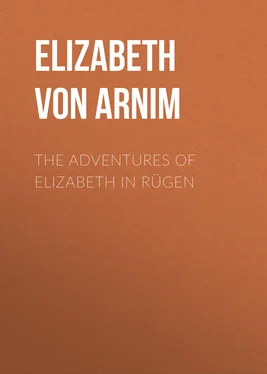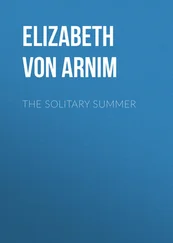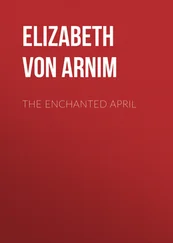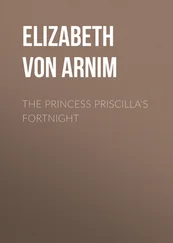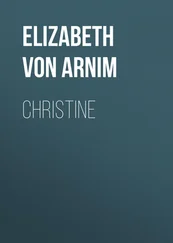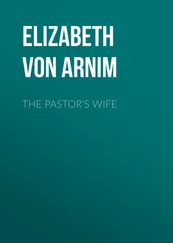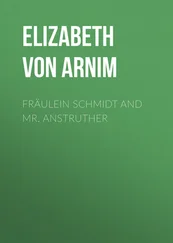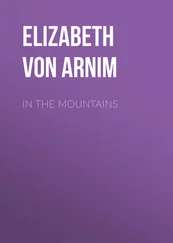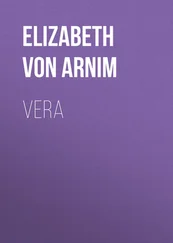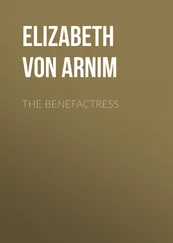Elizabeth von Arnim - The Adventures of Elizabeth in Rügen
Здесь есть возможность читать онлайн «Elizabeth von Arnim - The Adventures of Elizabeth in Rügen» — ознакомительный отрывок электронной книги совершенно бесплатно, а после прочтения отрывка купить полную версию. В некоторых случаях можно слушать аудио, скачать через торрент в формате fb2 и присутствует краткое содержание. Жанр: foreign_sf, foreign_antique, foreign_prose, на английском языке. Описание произведения, (предисловие) а так же отзывы посетителей доступны на портале библиотеки ЛибКат.
- Название:The Adventures of Elizabeth in Rügen
- Автор:
- Жанр:
- Год:неизвестен
- ISBN:нет данных
- Рейтинг книги:3 / 5. Голосов: 1
-
Избранное:Добавить в избранное
- Отзывы:
-
Ваша оценка:
- 60
- 1
- 2
- 3
- 4
- 5
The Adventures of Elizabeth in Rügen: краткое содержание, описание и аннотация
Предлагаем к чтению аннотацию, описание, краткое содержание или предисловие (зависит от того, что написал сам автор книги «The Adventures of Elizabeth in Rügen»). Если вы не нашли необходимую информацию о книге — напишите в комментариях, мы постараемся отыскать её.
The Adventures of Elizabeth in Rügen — читать онлайн ознакомительный отрывок
Ниже представлен текст книги, разбитый по страницам. Система сохранения места последней прочитанной страницы, позволяет с удобством читать онлайн бесплатно книгу «The Adventures of Elizabeth in Rügen», без необходимости каждый раз заново искать на чём Вы остановились. Поставьте закладку, и сможете в любой момент перейти на страницу, на которой закончили чтение.
Интервал:
Закладка:
After that Gertrud got along a little better, and my thoughts being no longer concentrated on food I could think out what was best to be done. The result was that on reaching Casnewitz we inquired at once which of the cottages was an inn, and having found one asked a man who seemed to belong there to let us have a conveyance with as much speed as possible.
'Where have you come from?' he inquired, staring first at one and then at the other.
'Oh—from Garz.'
'From Garz? Where do you want to go to?'
'To Putbus.'
'To Putbus? Are you staying there?'
'No—yes—anyhow we wish to drive there. Kindly let us start as soon as possible.'
'Start! I have no cart.'
'Sir,' said Gertrud with much dignity, 'why did you not say so at once?'
' Ja, ja, Fräulein , why did I not?'
We walked out.
'This is very unpleasant, Gertrud,' I remarked, and I wondered what those at home would say if they knew that on the very first day of my driving-tour I had managed to lose the carriage and had had to bear the banter of publicans.
'There is a little shop,' said Gertrud. 'Does the gracious one permit that I make inquiries there?'
We went in and Gertrud did the talking.
'Putbus is not very far from here,' said the old man presiding, who was at least polite. 'Why do not the ladies walk? My horse has been out all day, and my son who drives him has other things now to do.'
'Oh we can't walk,' I broke in. 'We must drive because we might want to go beyond Putbus—we are not sure—it depends–'
The old man looked puzzled. 'Where is it that the ladies wish to go?' he inquired, trying to be patient.
'To Putbus, anyhow. Perhaps only to Putbus. We can't tell till we get there. But indeed, indeed you must let us have your horse.'
Still puzzled, the old man went out to consult with his son, and we waited in profound dejection among candles and coffee. Putbus was not, as he had said, far, but I remembered how on the map it seemed to be a very nest of cross-roads, all radiating from a round circus sort of place in the middle. Which of them would August consider to be the straight continuation of the road from Garz? Once beyond Putbus he would be lost to us indeed.
It took about half an hour to persuade the son and to harness the horse; and while this was going on we stood at the door watching the road and listening eagerly for sounds of wheels. One cart did pass, going in the direction of Garz, and when I heard it coming I was so sure that it was August that I triumphantly called to Gertrud to run and tell the old man we did not need his son. Gertrud, wiser, waited till she saw what it was, and after the quenching of that sudden hope we both drooped more than ever.
'Where am I to drive to?' asked the son, whipping up his horse and bumping us away over the stones of Casnewitz. He sat huddled up looking exceedingly sulky, manifestly disgusted at having to go out again at the end of a day's work. As for the cart, it was a sad contrast to the cushioned comfort of the vanished victoria. It was very high, very wooden, very shaky, and we sat on a plank in the middle of so terrible a noise that when we wanted to say anything we had to shout. 'Where am I to drive to?' repeated the youth, scowling over his shoulder.
'Please drive straight on until you meet a carriage.'
'A what?'
'A carriage.'
'Whose carriage?'
'My carriage.'
He scowled round again with deepened disgust. 'If you have a carriage,' he said, looking at us as though he were afraid we were lunatics, 'why are you in my cart?'
'Oh why, why are we!' I cried wringing my hands, overcome by the wretchedness of our plight; for we were now beyond Casnewitz, and gazing anxiously ahead with the strained eyes of Sister Annes we saw the road as straight and as empty as ever.
The youth drove on in sullen silence, his very ears seeming to flap with scorn; no more good words would he waste on two mad women. The road now lay through woods, beautiful beechwoods that belong to Prince Putbus, not fenced off but invitingly open to every one, with green shimmering depths and occasional flashes of deer. The tops of the great beeches shone like gold against the sky. The sea must have been quite close, for though it was not visible the smell of it was everywhere. The nearer we got to Putbus the more civilised did the road become. Seats appeared on either side at intervals that grew more frequent. Instead of the usual wooden sign-posts, iron ones with tarnished gilt lettering pointed down the forest lanes; and soon we met the first of the Putbus lamp-posts, also iron and elaborate, wandered out, as it seemed, beyond the natural sphere of lamp-posts, to light the innocent country road. All these signs portended what Germans call Badegäste —in English obviously bath-guests, or, more elegantly, visitors to a bathing resort; and presently when we were nearer Putbus we began to pass them strolling in groups and couples and sitting on the seats which were of stone and could not have been good things for warm bath-guests to sit on.
Wretched as I was I still saw the quaintness and prettiness of Putbus. There was a notice up that all vehicles must drive through it at a walking pace, so we crawled along its principal street which, whatever else it contained, contained no sign of August. This street has Prince Putbus's grounds on one side and a line of irregular houses, all white, all old-fashioned, and all charming, on the other. A double row of great trees forms a shady walk on the edge of the grounds, and it is bountifully supplied with those stone seats so fatal, I am sure, to many an honest bath-guest. The grounds, trim and shady, have neat paths winding into their recesses from the road, with no fence or wall or obstacle of any sort to be surmounted by the timid tourist; every tourist may walk in them as long and as often as he likes without the least preliminary bother of gates and lodges.
As we jolted slowly over the rough stones we were objects of the liveliest interest to the bath-guests sitting out on the pavement in front of the inns having supper. No sign whatever of August was to be seen, not even an ordnance map, as I had half expected, lying in the road. Our cart made more noise here than ever, it being characteristic of Putbus that things on wheels are heard for an amazing time before and after their passing. It is the drowsiest little town. Grass grows undisturbed between the cobbles of the street, along the gutters, and in the cracks of the pavement on the sidewalk. One or two shops seem sufficient for the needs of all the inhabitants, including the boys at the school here which is a sort of German Eton, and from what I saw in the windows their needs are chiefly picture-postcards and cakes. There is a white theatre with a colonnade as quaint as all the rest. The houses have many windows and balconies hung about with flowers. The place did not somehow seem real in the bright flood of evening sunlight, it looked like a place in a picture or a dream; but the bath-guests, pausing in their eating to stare at us, were enjoying themselves in a very solid and undreamlike fashion, not in the least in harmony with the quaint background. In spite of my forlorn condition I could not help reflecting on its probable charms in winter under the clear green of the cold sky, with all these people away, when the frosted branches of the trees stretch across to deserted windows, when the theatre is silent for months, when the inns only keep as much of themselves open as meets the requirements of the infrequent commercial traveller, and the cutting wind blows down the street, empty all day long. Certainly a perfect place to spend a quiet winter in, to go to when one is tired of noise and bustle and of a world choked to the point of suffocation with strenuous persons trying to do each other good. Rooms in one of those spacious old houses with the large windows facing the sun, and plenty of books—if I were that abstracted but happy form of reptile called a bookworm, which I believed I am prevented from being only by my sex, the genus, I am told, being persistently male, I would take care to spend at least one of my life's winters in Putbus. How divinely quiet it would be. What a place for him who intends to pass an examination, to write a book, or who wants the crumples got by crushing together too long with his fellows to be smoothed out of his soul. And what walks there would be, to stretch legs and spirits grown stiff, in the crisp wintry woods where the pale sunshine falls across unspoilt snow. Sitting in my cart of sorrow in summer sultriness I could feel the ineffable pure cold of winter strike my face at the mere thought, the ineffable pure cold that spurs the most languid mind into activity.
Читать дальшеИнтервал:
Закладка:
Похожие книги на «The Adventures of Elizabeth in Rügen»
Представляем Вашему вниманию похожие книги на «The Adventures of Elizabeth in Rügen» списком для выбора. Мы отобрали схожую по названию и смыслу литературу в надежде предоставить читателям больше вариантов отыскать новые, интересные, ещё непрочитанные произведения.
Обсуждение, отзывы о книге «The Adventures of Elizabeth in Rügen» и просто собственные мнения читателей. Оставьте ваши комментарии, напишите, что Вы думаете о произведении, его смысле или главных героях. Укажите что конкретно понравилось, а что нет, и почему Вы так считаете.
